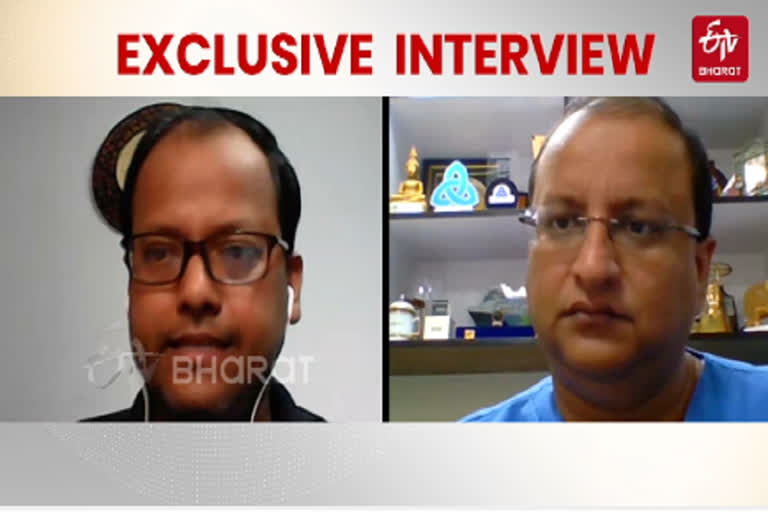New Delhi: Indian scientists, as well as the ministry of health and family welfare, have expressed serious concern over reports that people cured of Covid-19 infection are complaining of several other problems including chest pain, lung infections among others.
Talking to ETV Bharat, Dr Tamorish Kole, chief of emergency medicine at Medeor hospital and president of Asian Society of Emergency Medicine admitted the fact and said that people who have co-morbidities are prone to post COVID disease.
“Based on our experience we have seen that people who got cured of COVID-19 disease, have again returned to the hospitals with infections especially breathlessness. We found that lung fibrosis which is caused by coronavirus is causing this kind of problem,” said Dr Kole.
He further said that patients who are diabetic and insulin-dependent and discharged of coronavirus “their sugar control goes haywire.”
“They are the major people who again come back. There are some patients with diarrhoea and fever, but when we test, they prove to be Covid negative. So, coronavirus recovery does not mean that resurrection from everything,” said Dr Kole.
Hospitals across India are getting complaints with people coming with other infections. Hospitals authorities are now preparing their staff and informing them about such possible instances when a recovered person might land up at the hospital complaining about similar symptoms.
In fact, India’s apex medical research institute (ICMR) has also been doing a study on the issue.
“Study does not claim that this is a side effect of medicines. In fact, these are complications of Covid-19. Even if the patients are recovering from the deadly disease, it (the process) damages the lungs. Or the diabetic control remains an issue,” said Dr Kole.
He said that this is again a learning process for all the clinicians.
“As we go forward dealing with the disease, we will have more details on the post-coronavirus implications,” he stated.
Also Read: WHO warns there might never be a 'silver bullet' to defeat virus
According to a study published in a global medical journal named 'Nature Medicine' claimed that COVID-19 immunity lasts only between two to six months. “Although this is an ongoing area of research. There are some anecdotal reports which say that people got cured of the novel coronavirus but again were infected by the disease. But more data is required to appear at any conclusions, as there is no concrete evidence to ascertain that Covid can again revisit an already cured person,” he said.
On the question of whether Covid-19 is airborne, Dr Kole said, “If you are generating a lot of aerosols, this virus can remain alive in the aerosol. And that is why we have seen that in the intensive care unit where patients generate aerosol, the chances of people getting infected is more. If a lot of people are standing in a particular overcrowded place, that could be an area of risk. But in general, this virus does not seem to be born in the air.”
Referring to the Indian Covid vaccine, Dr Kole said that all three vaccines as we know are under human trials. “People are coming forward and volunteering in this journey. The Indian community, Indian scientists are working for hand in hands with the global experts. There is no shortcut to the vaccine. There is no chance that we can cut short the clinical trial. We all need to be patient and wait for a vaccine which could be used for the general public,” he said.
Also Read: Putin's daughter receives dose of world's first COVID-19 vaccine
He said that Russia seems to be an odd country which is claiming to be getting Covid vaccine. But the scientific evidence is not available to the world community, so at present, we can’t comment on the Russian vaccine, he said.
“As far as Indian vaccine is concerned, we are hopeful that by the end of this year we will have a Covid vaccine. And the Indian Pharma companies are also doing their best so that common people can also avail the vaccine,” he said.
On the question of whether home quarantine is good enough as a precaution against the deadly infection, Dr Kole said, “A home quarantine is absolutely fine. People who are asymptomatic can very well stay at home but people with moderate or severe symptoms should take health care support.”
Also Read: COVID exposed India health scenario: Health Expert



